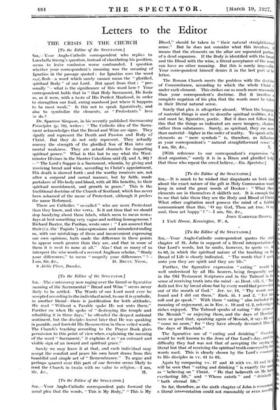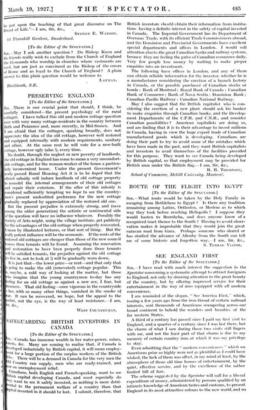[To the Editor of the SPECTATOR.]
0
SIR,—Your Anglo-Catholic correspondent quotes the ski chapter of St. John in support of a literal interpretation Our Lord's words, but he omits, however, to quote vv. 6 to 63, in which the spiritual nature of the teaching on Bread of Life is clearly indicated. " The words that I spra unto you they arc spirit and they are life."
Further, the figurative expression " eating " would t well understood by all His hearers, being frequently un'1 in the Old Testament Scriptures and in the Talmud in ilk sense of receiving truth into the mind—as Deut. viii. 3, 4* Ma7 doth not live by bread alone but by every word that proceeded out of the mouth of God." Jer. xv. 16, " Thy words Wer found and I did eat them." Ezek. iii. 1 and 2, " Eat till, roll and go speak." With them " eating " also included the meaning of enjoyment, as in Fee. v. 19 and vi. 2, referring t riches enjoyed. The Talmud speaks of eating " the years 0 the Messiah " or enjoying them, and the days of ilezekia were so good that, speaking again of Messiah, it says He Si "come no more," for " they have already deVoured Him in the days of Hezekiah."
The figurative use of " eating and drinking'' thereto would be well known to the Jews of Our Lord's day, and difficulty they had was not that of accepting the saying a' literal but that of receiving the spiritual truthconveyed by t words used. This is clearly shown by the Lord's comma to His disciples in vv. 61 .to 63.
Again by comparing vv. 47 and 48 with vv. 53 and 54 will be seen that " eating and drinking " is exactly the as " believing on " Christ. " He that believeth on Mc ha everlasting life," and " Whoso eateth " and drinketh' " Math eternal . life." - • So far, therefore, as the sixth chapter-of John is concern a literal internretation could not reasonably or even Doss
e
a he put upon the teaching of that great discourse on The Bread of Life."—I am, Sir, &c., ' _ .
11 Thornhill Gardens, Sunderland. SYDNEY E. WATSON.































































 Previous page
Previous page